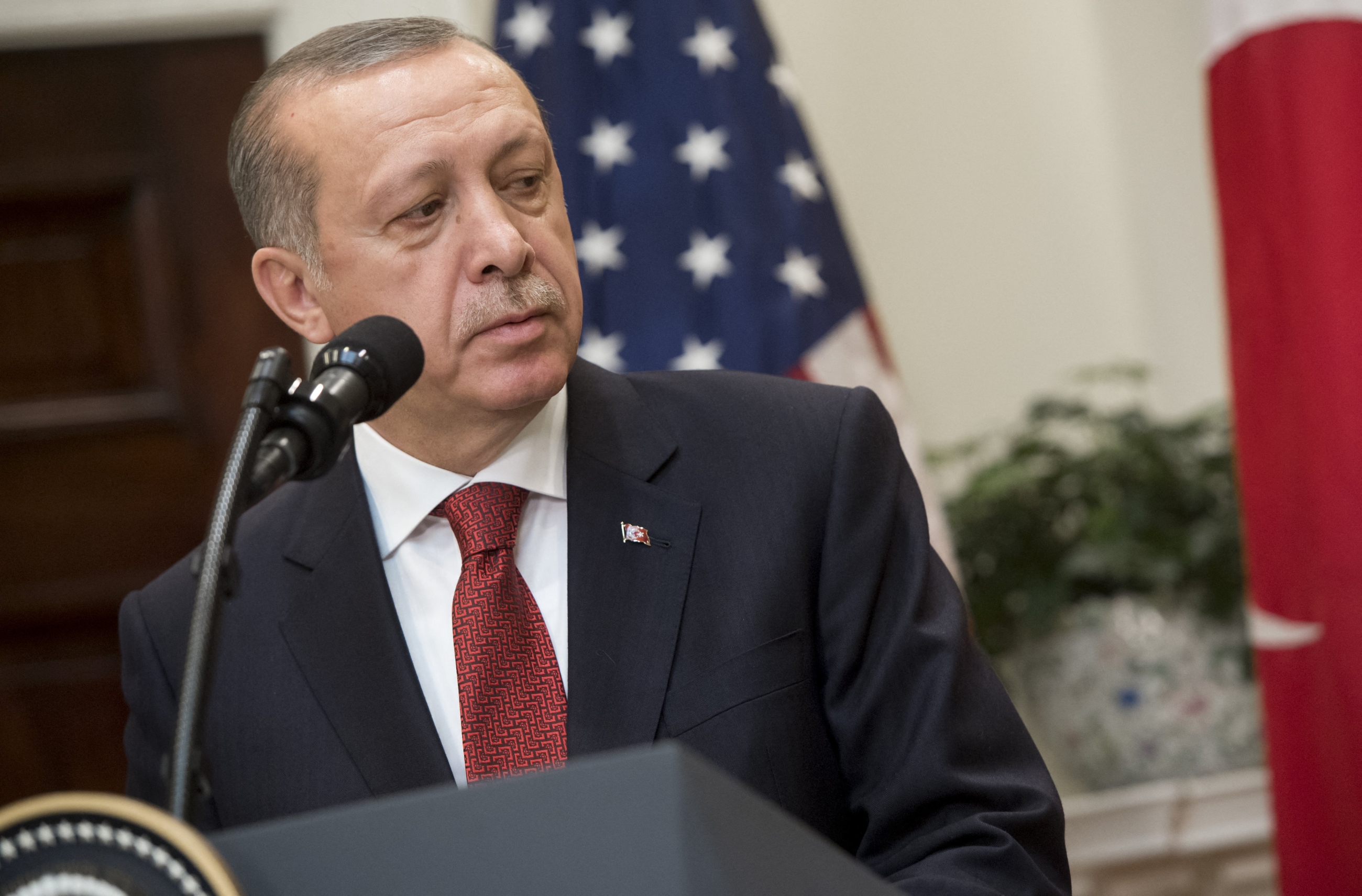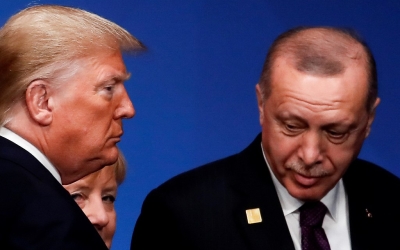Trump or Harris? Turkey's government can't decide which would be best

There are four days left until the US presidential election and the Turkish leadership in Ankara is split over which candidate they favour.
Turkish officials, speaking on condition of anonymity to Middle East Eye, believe either of the two outcomes would have a consequential impact on Turkey's foreign policy, as well as regional and global dynamics.
Many observers in Turkey believe President Recep Tayyip Erdogan is awaiting the election results in the United States before making his own policy decisions, even over his cabinet staffing.
Yet, officials have been particularly and unusually tight-lipped about their preferred candidate in this campaign period.
Erdogan’s only public outreach to either of the candidates was to Donald Trump via a phone call after the former president was shot at during a rally in Pennsylvania in July.
New MEE newsletter: Jerusalem Dispatch
Sign up to get the latest insights and analysis on Israel-Palestine, alongside Turkey Unpacked and other MEE newsletters
Media reports claimed in September that Erdogan tried to set up a meeting with Kamala Harris on the sidelines of the UN General Assembly in New York, but several Turkish officials denied it.
“Some officials have floated the idea but eventually no formal proposal had been made to Harris’ team,” a source familiar with the episode told MEE. “We kept our distance to both of the candidates and had not sought a meeting with Trump either.”
The leaders of other neighbouring countries, such as the United Arab Emirates President Mohammed bin Zayed Al Nahyan, opted to meet both Trump and Harris in September around the General Assembly.
Ups and downs
Turkey's non-engagement with the candidates stems from two things, sources in Ankara say.
First, Ankara is deeply confused about the possible ramifications - advantages and disadvantages - of a Trump or Harris presidency for Turkey's relationship with the US.
Many among Erdogan’s entourage believe a Trump presidency could work well with his government because the two have a history of sharing frequent engagements, such as phone calls and meetings, providing a space for the Turkish president to make a case on issues he cares about.
For example, during one call in 2019, Trump gave Erdogan the green light to conduct a military offensive in northern Syria that allowed Ankara to seize areas and deny US-allied Syrian Kurdish armed groups uninterrupted territory across the Turkish border.
When Washington sanctioned Turkey over its purchase of Russian-made S-400 air defence systems, Trump also picked the lightest sanctions package presented to him.
Despite the ups and downs, such as Trump imposing sanctions on Turkish ministers over the imprisonment of US pastor Andrew Brunson in 2018, people in Erdogan’s entourage believe both leaders have similar mentalities and could work together for broader objectives.
They say Berat Albayrak, Erdogan’s son-in-law and former finance minister, for instance, had a good relationship with Trump’s son-in-law, Jared Kushner.
However, several politicians at the ruling Justice and Development Party (AKP) and some top bureaucrats in relevant Turkish ministries say this is a misleading picture of Turkey’s relationship with Washington under the Trump administration.
“They always say Trump and Erdogan have had good dialogue. What concrete things have we achieved with that?” said a top politician at the AKP.
Others say Turkish ministries and institutions were not able to work properly with their US counterparts because of the constant churn of officials on the American side.
They also complain that Trump would often make promises and deals that wouldn’t result in any progress or follow-up. Apart from big promises and attention-seeking statements, little to nothing was achieved together during the first Trump term, they say.
For example, despite US President Joe Biden’s apparent dislike of Erdogan, both leaders authorised their foreign and defence ministries, as well as intelligence agencies, to work together and reach a middle ground on issues such as Sweden and Finland’s accession to Nato.
Earlier this year, Washington agreed to ink a multibillion dollar F-16 fighter jet deal with Ankara after Erdogan ratified Sweden’s Nato membership.
The bilateral trust has gradually grown to the point that both sides are discussing a possible sale of next-generation F-35 warplanes to Turkey and the Biden administration has been passing messages to Iran through Turkish interlocutors in Ankara.
Watching and waiting
There is an expectation among some Turkish officials that these dynamics could be maintained through a Harris administration.
Harris herself doesn’t have many foreign policy red lines and the expectation is that she would use bureaucracy and foreign policy gurus within the Democratic establishment to craft an institutional policy.
Ankara’s previous attempts to engage with Trump officials before the 2016 elections were educational
For example, her current national security advisor, Philip Gordon, could be considered a Turkey expert, as he has much experience working in the country and with its government. This could mean a stable and negotiated relationship rather than the ups and downs of the Trump administration.
The second reason Ankara has kept a studious silence is the election has been incredibly close. For weeks, the polls have been very tight and there is no indication that one candidate is more likely to emerge victorious.
Ankara’s previous attempts to engage with Trump officials before the 2016 elections were also educational.
Turkey’s bid to lobby Trump’s then-national security advisor Michael Flynn massively backfired when investigations into his activity treated Turkish efforts on par with Russian influence campaigns.
This time, the Turkish government doesn’t seek any adventures and maintains a by-the-book approach to the elections.
Middle East Eye delivers independent and unrivalled coverage and analysis of the Middle East, North Africa and beyond. To learn more about republishing this content and the associated fees, please fill out this form. More about MEE can be found here.


